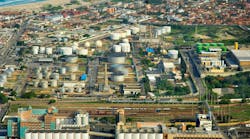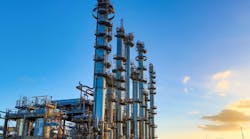ABUJA�While labor unions called for workers to stay off the job Thursday in protest of a government fuel price increase, Nigerian government officials countered that an increase in petroleum product prices at the pump will save the government $18 billion/year.
The price of gasoline rose by 50% to 30�/l. June 1, while diesel and kerosine prices increased to 29� from 19�/l. and to 27� from 17�/l., respectively. Information Minister Jerry Gana pointed out that the subsidies the government was paying on oil products had been starving social services of badly needed funds.
Gana said Tuesday the government planned to use the savings to "provide visible legacies for posterity."
Jackson Gaius-Obaseki, group managing director of the state-run Nigerian National Petroleum Corp., said raising prices was the only option because the corporation could not recover production costs at the old pump prices.
He said past mismanagement rendered the nation's refineries ineffective, forcing NNPC to resort to massive imports of petroleum products just to satisfy local demand. Between July and September 1999, the refineries, with a combined capacity to process 445,000 b/d of crude, could satisfy only half of domestic demand.
The plants�located in Warri in the southwest, Port Harcourt in the southeast, and Kaduna in the north�have been plagued by repeated operational failures in recent years. Gaius-Obaseki said refinery production fell to 40% of domestic demand in the third quarter of last year and to 25% in the first quarter of this year. The shortfall had to be met through imports.
He said the 125,000 b/d plant at Warri last underwent turnaround maintenance in 1994, while the Port Harcourt and Kaduna refineries are currently undergoing rehabilitation. Gaius-Obaseki noted that, at the old pump price of 20�/l. for gasoline, NNPC sustained a loss of 1.3�/l. Smuggling of cheap petroleum products to neighboring countries meant Nigeria was subsidizing not consumption of its own citizens but that of neighboring states.
Since NNPC now pays $20/bbl for crude allocated to it, instead of the old rate of $9.50, there is no way it could break even selling fuel at the old rates, he stressed. Meanwhile, the Nigeria Labor Congress, the umbrella group for the country's 42 industrial unions, has directed workers to stay off the job Thursday to picket all filling stations until the government reverts to the old fuel prices.

